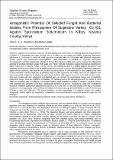| dc.contributor.author | E. O. A Juma, D. M Musyimi, Opande George | |
| dc.date.accessioned | 2020-12-14T06:57:01Z | |
| dc.date.available | 2020-12-14T06:57:01Z | |
| dc.date.issued | 2016 | |
| dc.identifier.uri | https://repository.maseno.ac.ke/handle/123456789/3420 | |
| dc.description.abstract | Sugarcane smut disease caused by a fungus Sporisorium scitamineum is a limiting factor to cane production in Kenya. It is threatening the sugar industry due to its effect on cane quality and yields. Sugarcane (Saccharum officinarum L.) is known to have microbial organisms associated with its rhizosphere with potential antagonistic activity against other rhizosphere microorganisms. Little information is available on sugarcane rhizosphere microorganisms and their antagonistic potential in Kenya. The objective of this study was to evaluate the antagonistic potential of selected microbial isolates from sugar cane Variety CO 421 rhizosphere against Sporisorium scitamineum within Kibos area, in Kisumu, Kenya. Variety CO 421 was selected because it is widely adapted and grown in all sugarcane growing areas of Kenya and its breaking resistance to smut. Screening for evaluation of potential antagonism against the test organism, were done in vitro by dual culture technique, in three replicates. In vivo screening was done in five treatments and five replicates by growing single budded sugarcane setts treated with the test organism and selected potential antagonists in plastic pots with steam sterilized soil in green house and in the field in micro plots. Setts were treated with four antagonists and distilled water as control. The experimental design was a completely randomized design. Data was collected on inhibition of mycelia growth of the test pathogen and the number of smut whips per treatment. Data on inhibition and disease incidence were subjected to analysis of variance. Treatment means were separated and compared using least Significance Difference at p=0.05. Trichoderma viride and Trichoderma herzanium inhibited Sporisorium scitamineum growth by 61% and 59% in vitro and showed 20% and 27% disease incidence in vivo respectively while AJB9 (unidentified) and Pseudomonas sp. showed inhibition zones of 25.6mm and 24.3mm in vitro and 13% and 17% disease incidence in vivo respectively. The selected isolates had evident antagonistic activity against the Sporisorium scitamineum hence recommended as potential biocontrol agent for this pathogen | en_US |
| dc.subject | antagonistic, biocontrol,disease incidence, invitro, screening, Sporisorium scitamineum | en_US |
| dc.title | Antagonistic Potential Of Selected Fungal And Bacterial Isolates From Rhizosphere Of Sugarcane Variety Co 421 Against Sporisorium Scitamineum In Kibos, Kisumu County, Kenya | en_US |
| dc.type | Article | en_US |

